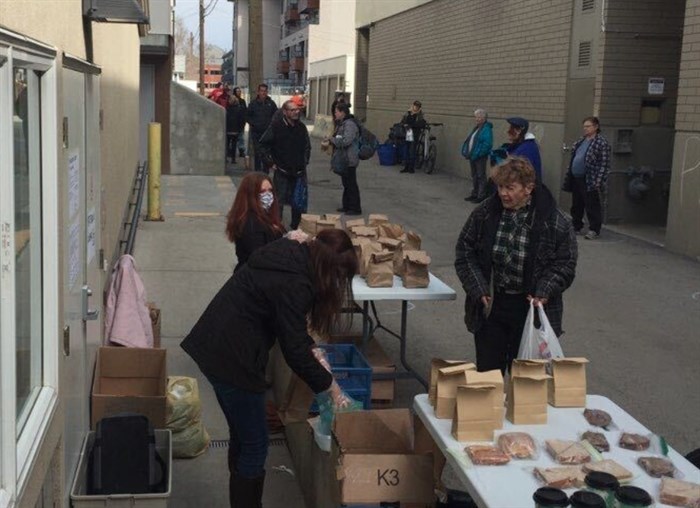
Volunteers have been offering to-go meals in accordance with social-distancing measures, and have been driving around other parts of Kamloops to find others who may be hungry.
Image Credit: SUBMITTED / Glenn Hilke
April 07, 2020 - 4:45 PM
The homeless and hungry in Kamloops are now getting free meals delivered to them, wherever they may be.
“We’re in lanes, we’re looking behind gas stations, we know where folks are hanging out,” says Glenn Hilke, who helped to launch the Kamloops COVID Meal Train. “Some of those folks I see, I know, and I know they are homeless. For other people, I just kind of get a feeling about maybe this is a person that needs some help.”
Hilke is the facilitator and coordinator of the Lived Experience Outreach Community and the new Kamloops COVID Meal Train, among other community projects. He says the Lived Experience team wanted to see a more united approach as to how the various Kamloops outreach organizations come together to ensure consistent meals on the north and south shores.
“We’ve never ever gotten together to figure out how we can work together to make sure that people on both sides of the river have access to three meals a day, so this particular response is not just to the crisis…. The crisis has exacerbated the ongoing reality.”
Big Brothers Big Sisters Kamloops, the Mustard Seed, the Kamloops Food Bank and the Mount Paul Community Food Centre are just a few of those who were represented in the first meeting about the new project, in which more than 50 people connected on Zoom.
Hilke said the need has been apparent for some time as existing programs have decreased service or shut completely in previous years. The final push to create this service came as COVID-19 left many people without adequate service from the soup kitchens and food banks they rely on.
Hilke says the Sunday Pit Stop program at Kamloops United Church shut down because of COVID-19 related worries, and the Mustard Seed stopped offering their twice a week meals around six months ago. To fill those gaps, the Meal Train now runs a takeaway option on tables outside of the Kamloops United Church on Sundays from 2:30 p.m. to 4 p.m., and nearby the Mustard Seed on Mondays from noon to 1 p.m. and again for 4 p.m. to 5 p.m. For the dinner service near Mustard Seed, Hilke says local shop Pizza Pi donated a dozen pizzas thanks to a new pay-it-forward donation program.
Credit: FACEBOOK / Pizza Pi
Since the street entrenched population can no longer gather at one central spot to share a meal because of COVID-19, the members figured it would be best to seek out those in need on the ground.
“We also drive things around on the north shore because not everybody can get to downtown,” Hilke says.
Once a day, two of the five volunteer drivers will drive around for an hour and a half. One driver travels from the Brock Shopping Centre to the Overlanders Bridge, while the other covers the downtown and Valleyview areas.
“We pull up on the passenger side," Hilke says. "The food is in the front passenger seat, properly packaged. We'll roll down the window and yell to the person, ‘Hi, how are you? How are you doing, are you hungry?’ Nine times out of ten people will say, ‘Oh, yes thank you so much,’ and their reflex is to get up and come to the vehicle. So right away we’ll just say, ‘No, that's okay, stay there.’”
The volunteers will ask the individual how many meals they would like to get them through the day, and then put the bagged meals on the hoods of the car for the person to come and grab. On the group's Facebook page, one volunteer driver said he handed out meals out to approximately 130 people.
For those who want to help but don’t want to drive and deliver, they can make meals, donate financially, or help by getting groceries, and can be reimbursed if they so wish. According to Hilke, all steps involved are done with extreme consideration for hygiene and social distancing recommendations.
So far, financial donations have exceeded $1,400.
Once the pandemic is no longer a public health concern, Hilke says the food exchange procedure will change, but the mission will continue.
For more information on this project and to find out how to donate time or money, check out the Facebook page.
To contact a reporter for this story, email Jenna Wheeler or call (250) 819-6089 or email the editor. You can also submit photos, videos or news tips to the newsroom and be entered to win a monthly prize draw.
We welcome your comments and opinions on our stories but play nice. We won't censor or delete comments unless they contain off-topic statements or links, unnecessary vulgarity, false facts, spam or obviously fake profiles. If you have any concerns about what you see in comments, email the editor in the link above.
News from © iNFOnews, 2020